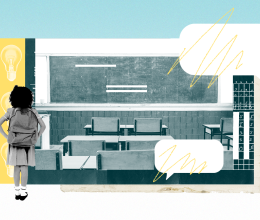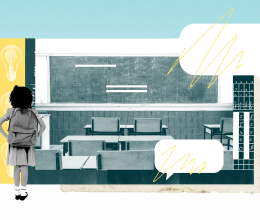
Rolando was born in Guatemala. Alongside his parents, Rolando moved to the United States when he was seven years old. Rolando lives with his wife and children in Idaho, his children attend schools in Boise.
As Rolando shared, although he and his wife received support from mentors, navigating the educational system as children of immigrants was difficult. His children’s experiences are very different from his own, largely because he can now help them navigate the system. According to Rolando, his children attend a school where students learn about diversity, which has had a positive impact on his children’s education. Yet, as a parent and through his law practice, he continues to see that Hispanic students across the state have different access to resources or are treated different compared to their other classmates, including when it comes to discipline.
Rolando completed his undergraduate degree in Utah and then attended law school in Idaho where he currently practices criminal defense and immigration law in the state.
How was your experience getting an education in Idaho?
It was difficult. I am a son of immigrants. My parents did not know the language and how to navigate the educational system. For example, when it came to paying to go to school. My parents had no clue how to guide me through the process, or with scholarships, or even filling out applications for college. So, it was difficult. I graduated high school in 1998 but did not return to college until 2013. It took me 15 years to get back to school and figure out the process of getting a higher education.
Nobody in my immediate circle knew how to help me. I was kind of a trailblazer. I had to go through it myself, trying to figure out resources or even studying materials.
I am full Guatemalan, but I do not look Guatemalan. So, I did have white privilege. I think it is a different experience for someone like me, even though I am Hispanic, going through [the education system], than someone who is not white-passing. Especially in an environment like this.
What have your children’s experiences attending school in Idaho been like compared to yours?
I have children who attend elementary school in Boise. Because of my educational journey and their mom’s educational journey, they have always seen the importance of education. We have been studying for ten years straight. Fortunately, they have that example, and they are amazing students. Education has taken front and center in our family versus the families where we grew up.
My wife is from Argentina, also a first-generation immigrant. We have very similar stories. Her parents always wanted her to go to school but they had no clue how to help or find resources for her. Fortunately, we had similar goals and education became a priority in our lives.
I think my kids see that example and they are emulating the same behaviors. They see the importance of education. Their lives are going to be dramatically different compared to the lives my wife and I lived as immigrants in the U.S.
Have your children ever received different access to educational resources because of their ethnic identity?
When my son started kindergarten when we first moved to Boise, they saw our last names, and the first thing the school administrators wanted to do was enroll him in another school “where they send all the immigrants who don’t speak English.” We purposefully taught our kids to speak only Spanish in the home so that they could learn the language, but our children are bilingual. And in this generally white-dominant environment where we enrolled them, they made very rash assumptions, and they were pushing us to go into this one [particular] school.
Because of our situation we were able to push back. Maybe other parents would just say, okay, thinking that that is how the system works. I believe that by making generalized assumptions about people, you start marginalizing students because of their ethnic background or racial perception.
There was another situation when two of my children went to elementary school. One of them has darker skin, but they were both in the same classroom. My son did not like the interactions or how [the teacher] treated him. She would ignore my kids or make them feel bad for trying to participate in the class. I could not decipher whether it was because of his darker complexion. But my son expressed many times that he felt uncomfortable. So, we kept a really close eye on the situation, and we did change schools soon after that.
Fortunately, where they go to school now is a very diverse environment. Most of their teachers are white but the student body is a lot more diverse. I think they are also more proactive in understanding all the different cultures. They proactively teach Black History month and Hispanic History month. I know my children would not have access to that if they were going to different schools. We had to do a lot of research, and unfortunately, we are very hesitant to enroll them in other school districts because of the poor education they would receive. I believe in public schooling, unfortunately, Idaho does not invest enough in public education. As a result, Idaho ranks very low in the quality of education compared to other states in the nation.
Do you see Latino or Hispanic students face other types of inequities?
I am a criminal defense attorney as well as an immigration attorney, so I see a lot of inequities of the justice system and in policing. My clients get bullied or targeted just because they look Hispanic. There is a lot of policing that is based on biases, including personal biases, or stereotypes about Hispanic people. My kids are not in high school yet, so I am not as hyperaware of this in their school district.
I had a case in Mountain Home where [underage school students] were accused of [sexual harassment behavior]. It looked like it was behavior that was going on in the school in general with several students. But only Hispanic kids were implicated as if it was not something that other students were also doing. The [Hispanic] parents were telling me that this happens a lot, where their kids are targeted but not the White kids. I also keep hearing back from parents in this community and they tell me their children are bullied and the teachers do not do anything.
What do you think needs to change to better support Hispanic students in Idaho?
I think education needs to be a little bit less Eurocentric and make it more diverse as far as understanding other cultures, languages, ethnicities, and countries. When you only teach one point of view, that is when the problems come. There has to be more awareness. In my kid’s current school, they are constantly talking about other worldviews, other religions, and they really try to tell history as it happened although it may not be the American exceptionalism version.
I also saw the difference in the students when we transferred our children to their current school. We noticed a lot less bullying, and a lot more friendships between students from different walks of life. It is just a lot more accepting because I think the kids are a lot more educated in diversity and diverse topics than what you would see in other schools.
The Education Equity for Latinx Students project started in the fall of 2022 as part of our efforts to expand racial justice work on behalf of Idaho students, beginning with Latinx communities.
READ MORE STORIES AND LEARN ABOUT THE EDUCATION EQUITY FOR LATINX PROJECT
SHARE YOUR EDUCATION STORY WITH THE ACLU OF IDAHO
